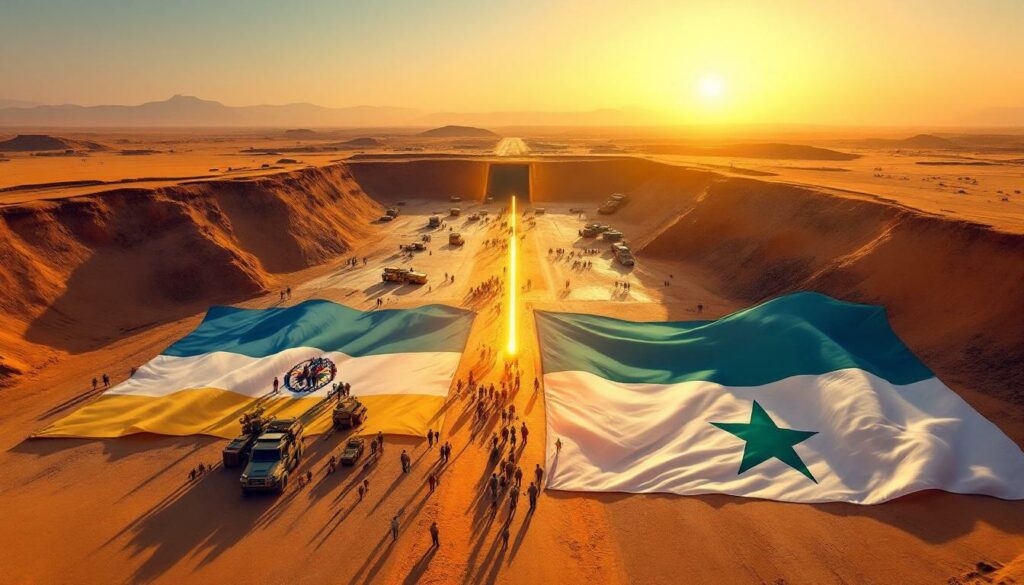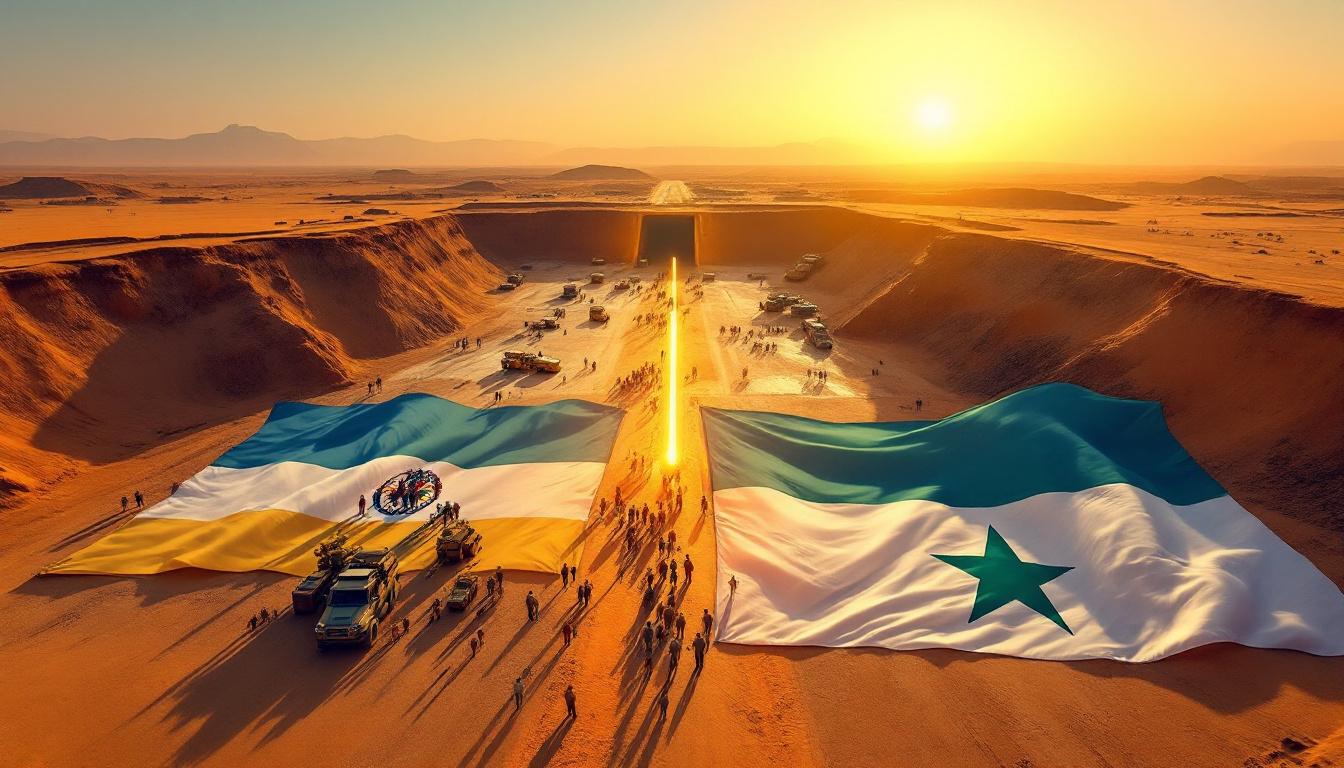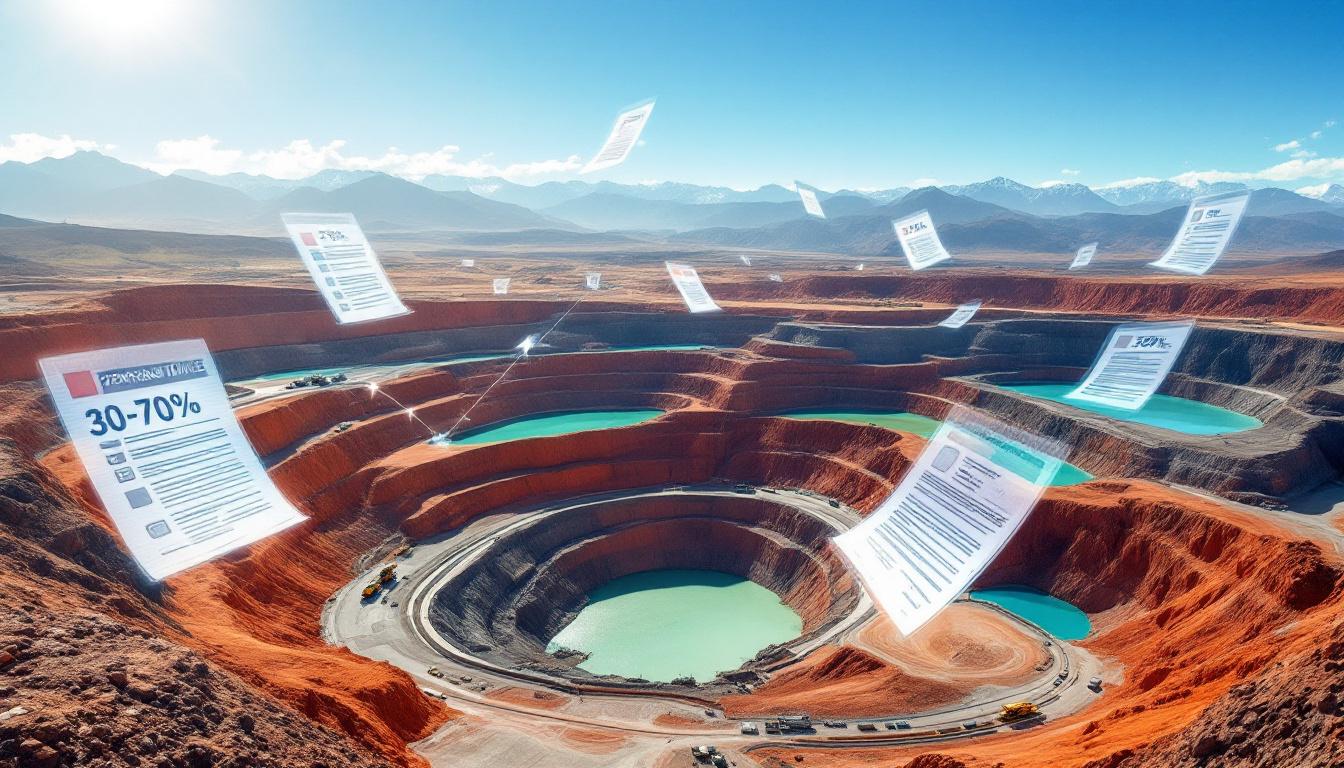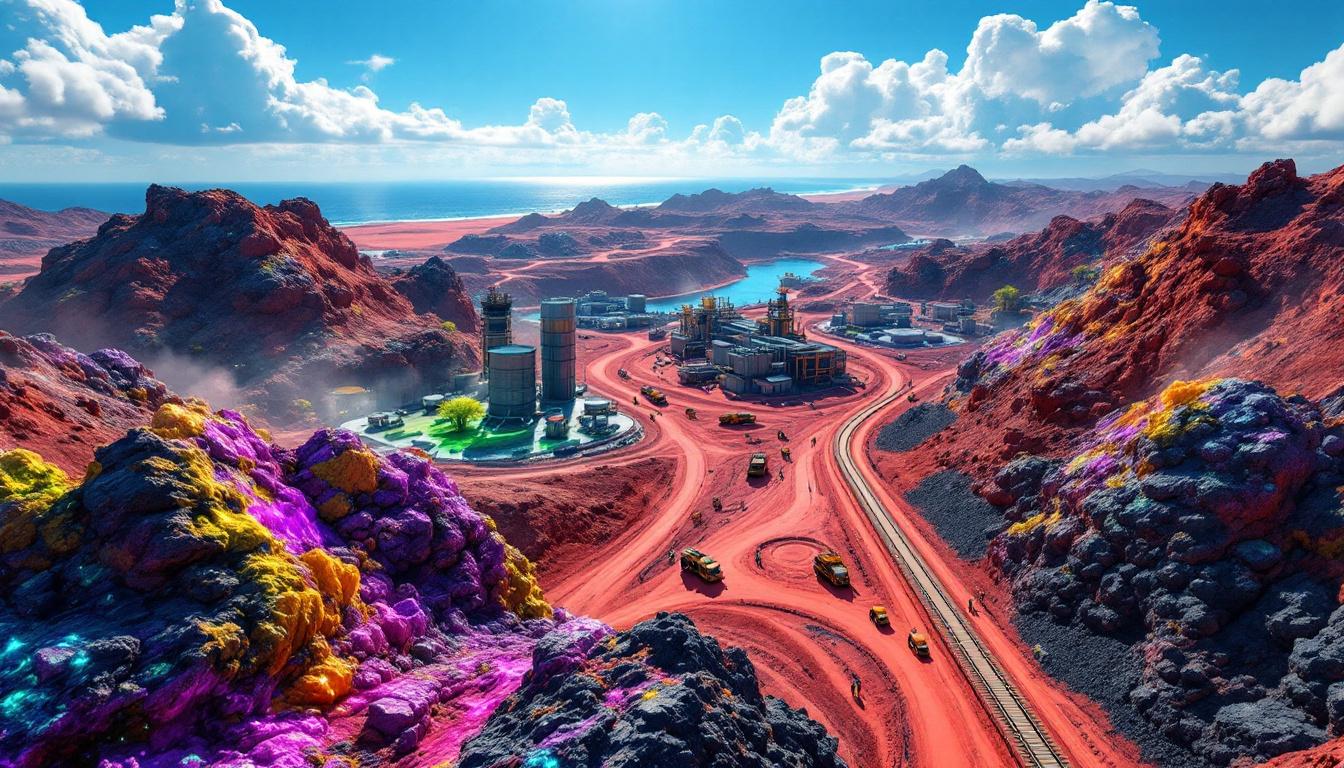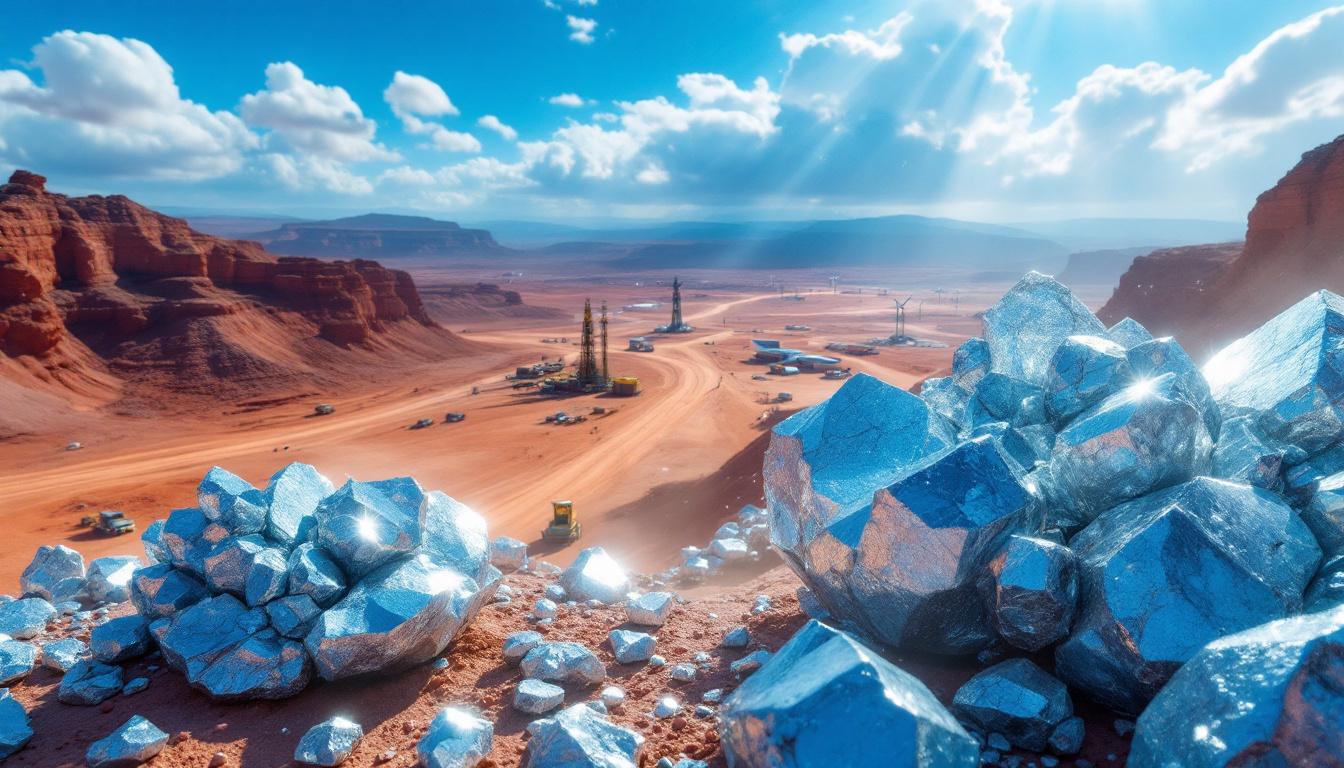What is Happening with Orano's Uranium Joint Venture in Niger?
The French nuclear giant Orano finds itself in a deepening crisis as its uranium mining joint venture in Niger, SOMAIR, teeters on the brink of bankruptcy. This development comes after Niger's military government seized control of the mine in December 2024 and subsequently announced plans to nationalize the operation, creating significant uncertainty for uranium production in the region.
The dispute between Orano and Niger's authorities has been escalating for over a year, with production now suspended and financial stability severely compromised. According to company statements, Orano began alerting Niger's government about SOMAIR's deteriorating financial condition as early as October 2024, but the situation has only worsened.
"The financial situation has become critical," an Orano spokesperson stated in a recent press briefing. "Despite our efforts to maintain operational viability, the export restrictions have made continuing operations financially impossible."
When fully operational, Niger provided approximately 15% of Orano's global uranium supply, making this dispute a significant blow to the company's production capacity and a critical issue for Niger's economy.
How Did the Niger-Orano Uranium Crisis Begin?
The roots of the current crisis can be traced to shifting political dynamics in Niger following the military takeover in 2023. Relations between the new military government and French interests, including Orano (formerly known as Areva), have steadily deteriorated as part of a broader pattern of anti-Western sentiment.
The situation reached a critical point in December 2024 when Niger's military government seized physical control of the SOMAIR mine, citing "national sovereignty concerns" and "historical imbalances" in the partnership agreement. This takeover was accompanied by an announcement of the government's intention to nationalize uranium operations.
Prior to this dramatic step, tensions had been building throughout 2024, with disagreements over revenue sharing, operational control, and export permissions creating an increasingly hostile business environment. Orano reports that multiple attempts at negotiation were rebuffed as the military government adopted a more confrontational stance.
"The situation represents an unprecedented escalation compared to previous tensions," noted mining analyst Marie Dumont. "Unlike the 2014 renegotiations which resulted in revised terms, the current military government appears determined to take full control regardless of economic consequences."
What Export Restrictions Led to the Financial Crisis?
Government-Imposed Limitations
The primary factor pushing SOMAIR toward bankruptcy has been the comprehensive export restrictions imposed by Niger's military government. These restrictions effectively created a stranglehold on the joint venture by preventing it from selling uranium on international markets, thereby eliminating virtually all revenue streams while expenses continued to accumulate.
According to Orano's financial disclosures, these export bans have blocked 100% of international sales since December 2024, creating an unsustainable cash flow situation. Meanwhile, Niger authorities have insisted on maintaining production costs at pre-crisis levels, creating a financial vise that has squeezed SOMAIR to the breaking point.
"The combination of zero export revenue and mandated production costs represents a textbook recipe for bankruptcy," explained mining economist Jean-Paul Benoît. "No mining operation can survive long under such conditions."
Financial Burden Distribution
Orano has highlighted that its state-owned partner, SOPAMIN (Société du Patrimoine des Mines du Niger), has consistently avoided sharing production costs during periods when uranium market volatility was high. This arrangement has forced Orano to shoulder what it describes as an "unfair share" of the financial burden by:
- Purchasing additional uranium above its shareholding percentage
- Maintaining the mine's financial stability without proportional support from its partner
- Absorbing operational losses that should have been shared based on ownership stakes
- Providing technical expertise and equipment maintenance at its own expense
Industry analysts estimate that this imbalanced cost-sharing arrangement has cost Orano tens of millions of euros over the partnership's duration, creating significant tension even before the current crisis emerged.
What is the Current State of the SOMAIR Operation?
Despite Orano's claims about imminent bankruptcy, Niger's main mineworkers' union has publicly stated that production at the mine will continue. The union has taken a confrontational stance, accusing Orano of deliberate sabotage—allegations that the French company firmly denies.
"These accusations are completely unfounded and appear designed to create a pretext for government action," an Orano representative responded. "Our priority remains protecting our employees and preserving the value of assets during this dispute."
The operational reality on the ground remains murky. While the union claims operations continue, satellite imagery analysis from industry watchdogs indicates minimal activity at the site since January 2025. Technical experts note that maintaining uranium mining operations without Orano's specialized expertise would be challenging, particularly regarding safety protocols and quality control.
The mine's 1,200 employees face uncertainty about their future, with Orano indicating that its priority for remaining financial resources is ensuring salary payments and maintaining industrial facilities to prevent deterioration of the assets.
How Does This Fit into Regional Mining Trends?
Growing Resource Nationalism
The situation in Niger reflects a broader trend of resource nationalism sweeping across West Africa. Several countries in the region are asserting greater control over their natural resources by:
- Renegotiating terms with Western mining companies
- Seeking increased government ownership stakes
- Exploring partnerships with alternative international players, particularly from Russia and China
Similar developments have occurred in neighboring countries:
- Mali has placed Barrick Gold's Loulo-Gounkoto gold complex under state control, increasing government ownership from 20% to 65%
- Burkina Faso is seeking larger shares in mining operations from Western companies, targeting minimum 35% state ownership
- Guinea has also shown interest in restructuring mining agreements while exploring Russian partnerships for its massive bauxite reserves
These moves represent a significant shift in the regional mining landscape that has dominated West African resource extraction for decades.
Geopolitical Realignment
The resource nationalism trend coincides with a broader geopolitical realignment as these countries pivot away from traditional Western allies, particularly France, toward Russia and China. This shift has created opportunities for mining companies from these nations to gain footholds in resource-rich regions previously dominated by Western corporations.
"What we're seeing is not merely economic negotiation but a fundamental realignment of strategic partnerships," explains Dr. Ibrahim Coulibaly, a political economist specializing in West African resource governance. "Countries like Niger are using mineral resources as leverage in broader geopolitical repositioning."
What are the Market Implications?
The timing of this dispute coincides with significant movements in uranium markets. Spot prices for uranium have increased by 7% in the first six months of 2025, reaching a seven-month high of $79 per pound in late June. This price surge makes the export restrictions particularly costly for both Orano and Niger.
For global uranium markets, the potential loss of SOMAIR's production capacity could further tighten supply at a time when demand for nuclear fuel is growing due to renewed interest in nuclear energy as a low-carbon power source. Niger ranks as the world's fourth-largest uranium producer, historically accounting for approximately 5% of global uranium production.
Market analysts have noted several key implications:
- Supply constraints: The global uranium market was already tightening before the Niger situation, with inventories declining steadily since 2023
- Price pressure: Further supply disruptions could push uranium prices toward the $90-100/lb range by late 2025
- Utility concerns: Nuclear power plant operators, particularly in Europe, may need to secure alternative supply sources
- Competitor advantage: Major producers in Kazakhstan, Canada, and Australia are positioned to increase market share
"The uranium market was already in a structural supply deficit before the Niger situation," notes commodity analyst Sarah Johnson. "This dispute adds another layer of complexity to an already tight market."
What Legal Options Does Orano Have?
Orano has emphasized its right to pursue legal action, though it has not yet specified exactly what form this might take. The company appears to be prioritizing the allocation of remaining financial resources toward:
- Ensuring employee salaries are paid
- Maintaining industrial facilities to prevent deterioration
- Preserving the value of assets during the dispute
International arbitration remains the most likely avenue for Orano to seek compensation for what it may claim as expropriation or breach of investment agreements. The company would likely pursue recourse through mechanisms established in the France-Niger Bilateral Investment Treaty, which provides protections for foreign investors against nationalization without fair compensation.
Legal experts suggest several potential approaches:
- Filing for arbitration with the International Centre for Settlement of Investment Disputes (ICSID)
- Seeking emergency measures to protect assets while arbitration proceeds
- Pursuing diplomatic intervention through French government channels
- Negotiating a settlement that includes fair compensation for seized assets
"The legal process will be complex and potentially lengthy," explains international arbitration specialist Philippe Leblanc. "Similar cases typically take 3-5 years to resolve, though emergency measures might provide some immediate relief."
What are the Stakes for Both Parties?
For Niger:
- Resource sovereignty: Control over a strategic natural resource that has historically been dominated by foreign interests
- Economic implications: Potential short-term economic gains from nationalization if operations can be maintained successfully
- Technical challenges: Risk of losing critical technical expertise and investment if the transition is mismanaged
- Geopolitical positioning: Strengthened relationships with Russia and China as alternative partners in resource development
- International reputation: Potential negative impact on future foreign investment if expropriation occurs without fair compensation
For Orano:
- Supply chain disruption: Loss of access to a significant uranium source representing 15% of its supply
- Financial impact: Substantial financial losses from investments in infrastructure and operations estimated at over €300 million
- Shareholder confidence: Potential damage to shareholder confidence and stock valuation
- Supply commitments: Need to secure alternative uranium sources to meet customer commitments
- Precedent concerns: Worry that similar actions could spread to other operations in the region
The dispute also raises broader questions about the future of Western mining interests across West Africa, as resource nationalism gains momentum and new geopolitical alignments emerge.
What Happens Next for SOMAIR?
The immediate future of SOMAIR remains uncertain. Several possible scenarios could unfold:
-
Bankruptcy and Liquidation: If financial resources are completely depleted, formal bankruptcy proceedings could begin, potentially leading to asset liquidation. This would likely involve complex legal proceedings under Niger's bankruptcy laws, with uncertain outcomes for all stakeholders.
-
Government Takeover: Niger's government might complete its nationalization plans, taking full control of operations with or without compensation to Orano. The government would then need to demonstrate its ability to operate the mine effectively without Orano's technical expertise.
-
Negotiated Settlement: Economic realities might force both parties back to the negotiating table to find a compromise that allows operations to continue. This could involve a restructured ownership agreement with increased government participation but continuing technical involvement from Orano.
-
International Intervention: Given uranium's strategic importance, international diplomatic pressure might be applied to resolve the dispute. France has already expressed "serious concern" over the situation, and other Western nations with interests in regional stability might also become involved.
Mining industry analysts suggest the most likely outcome combines elements of scenarios 2 and 3—a negotiated settlement that increases Niger's ownership stake while preserving some role for Orano, particularly in technical operations.
"Complete nationalization without technical support would be challenging for Niger to implement successfully," notes mining consultant Robert Williams. "A negotiated solution that acknowledges Niger's sovereignty concerns while preserving Orano's technical involvement would be the most pragmatic outcome."
FAQs About the Orano-Niger Uranium Dispute
How important is Niger to global uranium production?
Niger ranks as one of the world's top uranium producers, with its mines historically accounting for approximately 5% of global uranium production. The country has been the world's fourth-largest uranium producer, making it a significant player in global nuclear fuel supply chains. Niger's uranium is particularly important to European markets, where it has traditionally supplied fuel for nuclear power plants in France and other EU countries.
Who owns SOMAIR?
SOMAIR (Société des Mines de l'Aïr) is a joint venture between French nuclear fuel company Orano (formerly Areva), which holds a 63.4% stake, and SOPAMIN, Niger's state-owned mining company, which owns the remaining 36.6%. The exact ownership percentages have been a point of contention in the ongoing dispute, with Niger's government seeking to increase its stake significantly.
Could other countries fill the uranium supply gap?
Major uranium producers like Kazakhstan (43% of global production), Canada (13%), and Australia (12%) have the capacity to increase production to offset potential shortfalls from Niger. However, bringing new production online takes time, and the market is already experiencing tightening supply conditions as nuclear power experiences renewed interest globally.
Kazakhstan's Kazatomprom, the world's largest uranium producer, has indicated it could increase production by up to 10% if market conditions warrant. However, transportation logistics and existing supply contracts limit how quickly additional uranium can reach markets previously served by Niger.
What impact might this have on nuclear energy markets?
While significant for Orano specifically, the global uranium market can likely absorb the disruption from SOMAIR's troubles. However, if similar resource nationalism spreads to other uranium-producing nations, it could create more substantial supply concerns for nuclear utilities, potentially driving prices higher.
Nuclear power plants typically maintain fuel inventories sufficient for 18-24 months of operation, providing some buffer against short-term supply disruptions. However, sustained supply constraints could eventually impact fuel costs and potentially the economics of nuclear power generation.
Has this happened before with Orano in Niger?
Orano (previously operating as Areva) has experienced tensions with Niger's government before, including renegotiations of mining agreements in 2014 when the country sought better terms. However, the current situation represents an unprecedented escalation that threatens the entire joint venture structure.
The 2014 negotiations resulted in revised royalty rates and greater local employment commitments but did not fundamentally alter the ownership structure or operational control of the mines. The current dispute, by contrast, appears aimed at completely restructuring or potentially ending the partnership.
What are the environmental implications of the dispute?
One often overlooked aspect of the dispute concerns environmental management and rehabilitation responsibilities. Uranium mining creates significant environmental challenges, including radioactive waste management and water contamination risks.
If Orano exits without a clear transition of environmental responsibilities, there are concerns about whether proper environmental management practices will continue. Orano has developed specialized protocols for managing these risks, and any disruption in these practices could have long-term environmental consequences for surrounding communities.
This dispute occurs against a backdrop of other significant developments in the global uranium sector, including uranium mining halt announcements from other major producers and shifting uranium market dynamics worldwide. Furthermore, the recent US uranium import ban against Russian materials and potential US uranium tariff threats against other producers have created additional complexities in global nuclear fuel supply chains.
According to Reuters, Orano officials have warned that the SOMAIR operation "cannot continue to function" under the current conditions imposed by Niger's authorities, underscoring the severity of the situation. Meanwhile, Business Insider Africa reports that local officials dispute Orano's claims, suggesting the standoff is far from resolution.
Want to Stay Ahead of the Next Major Uranium Discovery?
Discovery Alert's proprietary Discovery IQ model instantly identifies significant ASX mineral discoveries, providing you with real-time notifications on potentially lucrative uranium investment opportunities before the broader market catches on. Explore how historic discoveries have generated substantial returns by visiting our dedicated discoveries page and position yourself for success in the dynamic uranium market.
